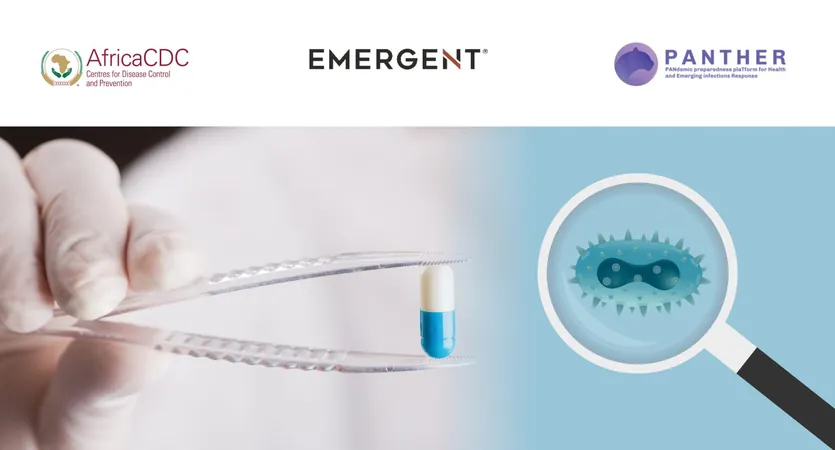
Pioneering MOSA Trial Aims to Combat Mpox Threat in Africa
2025-01-16
Author: John Tan
Introduction
Addis Ababa, Kinshasa, Washington, Paris – January 15, 2025 – The Africa Centers for Disease Control and Prevention (Africa CDC) is making significant strides in the battle against Mpox through the initiation of the MOSA trial, a groundbreaking pan-African clinical study designed to test new therapeutic options for this emerging health threat. Supported by European Union funding, the first patients have been enrolled at Mbandaka Hospital in the Democratic Republic of Congo (DRC), marking a crucial milestone in the fight against Mpox, which was declared a Public Health Emergency of Continental Security in August 2024.
Need for Immediate Action
As cases of Mpox, notably Clade Ib, begin to appear outside of Africa, and with Clade I and II cases continuing to rise on the continent, immediate action is needed to explore effective treatments. High-risk populations, particularly women, children, and those living with HIV, remain particularly vulnerable, emphasizing the urgency of this research endeavor. Although studies like PALM 007 and STOMP have fallen short in demonstrating effective therapies for Mpox, the MOSA trial could pave the way for new options.
Trial Details
The MOSA trial will rigorously evaluate the safety and efficacy of potential antiviral treatments, starting with brincidofovir, which is offered by Emergent BioSolutions. While the drug is currently available in the U.S. only under an Investigational New Drug status for single patients, comprehensive testing to confirm its effectiveness in humans for Mpox continues to be a necessity. In this trial, patients will be given either the antiviral or a placebo in a controlled manner over two weeks.
Expected Outcomes
The anticipated first interim analysis is expected by the end of the first quarter of 2025, as the Africa CDC aims to provide concrete results and solutions to a growing Mpox crisis. Dr. Jean Kaseya, Director General of Africa CDC, echoed the sentiment of African leadership in this crisis: “Our research efforts underscore African ownership and innovation in tackling health challenges uniquely faced by our continent. The MOSA study is not just a clinical trial; it symbolizes our commitment to finding sustainable solutions.”
Collaborative Efforts
The MOSA trial, sponsored by the PANTHER research initiative, represents a collaborative effort that goes beyond the immediate training of clinical staff. It signifies a shift towards proactive pandemic preparedness in Africa, emphasizing the importance of readiness in facing not only Mpox but future infectious threats.
Focus on Vulnerable Populations
As the situation in the DRC progresses, the trial will include both adults and children, particularly targeting vulnerable cohorts in remote regions. Insights gleaned from this research will not only assist in the current crisis but are vital for preparing for future epidemiological challenges, as highlighted by Prof. Samba Ousmane Sow, another key figure in the initiative.
Conclusion
In conclusion, the MOSA study epitomizes the spirit of collaboration and innovation required to combat health emergencies. With the backdrop of rising Mpox cases, the success of this trial could significantly shift the landscape of infectious disease control in Africa, potentially providing powerful new treatment options for vulnerable populations. As global health experts continue to stress the importance of finding treatments and vaccines against infectious diseases, the world will be watching closely to see how this ambitious study unfolds and what breakthroughs it may bring to light.





 Brasil (PT)
Brasil (PT)
 Canada (EN)
Canada (EN)
 Chile (ES)
Chile (ES)
 Česko (CS)
Česko (CS)
 대한민국 (KO)
대한민국 (KO)
 España (ES)
España (ES)
 France (FR)
France (FR)
 Hong Kong (EN)
Hong Kong (EN)
 Italia (IT)
Italia (IT)
 日本 (JA)
日本 (JA)
 Magyarország (HU)
Magyarország (HU)
 Norge (NO)
Norge (NO)
 Polska (PL)
Polska (PL)
 Schweiz (DE)
Schweiz (DE)
 Singapore (EN)
Singapore (EN)
 Sverige (SV)
Sverige (SV)
 Suomi (FI)
Suomi (FI)
 Türkiye (TR)
Türkiye (TR)